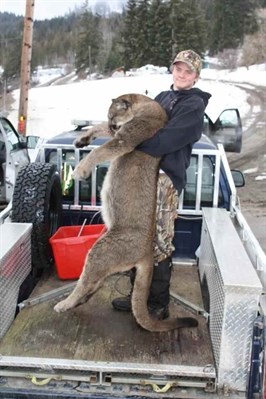
Dylan Trumbley, the son of local biologist Dean Trumbley, holds one of the shot cougars.
Image Credit: Submitted
February 19, 2013 - 1:16 PM
By Charlotte Helston
Residents of Grindrod can finally let their dogs out without worrying they might not come back whole. Or at all. And though the ordeal is over, they won't soon forget the fear that gripped them for a month as two young cougars—brothers—crept about their properties seeking convenient snacks.
For Angela Giesbrecht, news that the cougar responsible for her dog's death was no longer on the prowl brought some relief. It meant her three other dogs were out of danger. But it couldn't erase the memory of finding Ariel, her ten year-old collie, in the clutches of a 130-pound cougar.
"Ariel was a farm dog, she protected the other animals," Giesbrecht says. "Every night she would trot the property, barking... She did the same thing for eight years."
But one night, Ariel's barking sounded different. It sounded panicked, and when Giesbrecht looked out her window at 1:30 a.m. she could see why.
"When I came outside the cougar dropped her and turned away. He didn't run, he walked. He wasn't scared."
Giesbrecht scooped up Ariel who was bleeding but able to walk. She bandaged her up and prepared to take her to the vet first thing in the morning. Outside, she could see the cougar sitting just 30 feet away, "waiting".
Ariel's skull was crushed, and because of brain damage was put down by the vet the next day. The attack was not random. Two cougars had been systematically targeting dogs for weeks already, showing up on people's decks and consuming their catches in front yards. Unlike Giesbrecht, many dog owners never got the chance to say goodbye.
In the beginning, the community assumed coyotes were the animals behind the slaughter. But eventually, more and more reports of cougars spotted in the act confirmed the situation.
Grindrod resident Mary Samplonius, who captains the neighbourhood block watch, says she knows of seven dogs that died and three that survived. She suspects there are others that weren't reported. In her 27 years living in Grindrod, she's never seen anything like it.
She used the block watch network—usually used to keep robbers at bay—to warn the community. On a daily basis, she would make calls to update people on where the cougars were striking and remind them to keep a close eye on their pets.
"One dog came home with its face ripped off, and for another, there was nothing left but a collar and his skull," she says, noting just two of the traumatic incidents.
"The cougars were smart, they never went back twice," she says.
Taking on the protection of the neighbourhood locally is something Samplonius believes kept many pets alive.
"(The situation) is sad, but it makes you proud of the neighbourhood," she says. "A lot more dogs would have been lost if we couldn't communicate with each other."
It was Samplonius who got in touch with Shane Brady, a local hunter, seeking a solution to the cougar problem. Along with conservation officers, Brady and his hounds tracked the first cougar who was shot and taken to Vernon for an autopsy.
"(It was) really, really fat," Brady says of the 130 lb cat. "(He) wasn't doing much other than eating."
Brady has been involved in taking down hundreds of cougars in the last 35 years, and says attacks on dogs and cats are quite common.
"This is a pretty bad one," he admits. "But I dealt with a cougar on the north shore that had gotten 17 dogs."
The next day, wildlife biologist and television host for a Wild T.V. show Dean Trumbley was filming for Trigger Effect, a hunting and fishing show. He got a call asking his crew to assist in taking down the second cougar, who had been spotted chasing a woman's cat.
With the good word from the conservation officers, Trumbley's son Dylan shot the cougar. Trumbley is Métis, and says his family will eat the meat and use the fur. The hunt was filmed by Trumbley's group and will be featured on Trigger Effect.
Though it saddens Trumbley to see two beautiful cougars killed, he says it had to be done.
"These toms (male cougars) were getting more brazen," he says. "It would only have been a matter of time before there was a human attack."
He says cougars usually drag their prey to a private spot before digging in, and the fact they were consuming dogs right in people's yards was quite disturbing.
He says relocating the toms was out of the question because once they get the taste of something, they'll be back for it. And while he sees the violent side of the animals, he doesn't blame them for it.
"People always see it as them encroaching on us, but they're losing their habitat," he says. "Cougars are predators, they came down here, found easy prey... and they thrived."
He says deforestation, new developments, transportation corridors, and recreational activities like snowmobiling are all cumulative factors that push wildlife to expand out of their former range. Though the episode was frightful for the community, Samplonius understands Trumbley's perspective too.
"Think of the logging just up the mountain at Larch Hills," Samplonius says. "That's taking away (the cougar's) habitat, where are they supposed to go?"
"I love the wildlife, and I feel bad, but we never had anything like this happen before," she says. "We're dog lovers, they're family."
To contact a reporter for this story, email Charlotte Helston at chelston@infotelnews.ca or call (250)309-5230
News from © iNFOnews, 2013